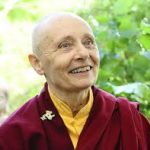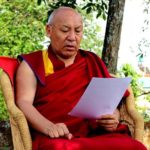What: A Darshan in Vimalakirti Sutra
When: 28-29 April 2015
Where: Deer Park Institute, Bir
Who: Dzongsar Khyentse Rinpoche
The Vimalakīrti Nirdeśa Sūtra (Sanskrit: विमलकीर्तिनिर्देशसूत्र) or Vimalakīrti Sūtra is a Mahayana Buddhist sutra. Sometimes used in the title, the word nirdeśa means “instruction, advice”. The sutra teaches, among other subjects, the meaning of nondualism. It contains a report of a teaching addressed to both arhats and bodhisattvas by the upāsaka (lay practitioner) Vimalakīrti, who expounds the doctrine of śūnyatā to them. This culminates with the wordless teaching of silence. The sutra has been influential in East Asian Buddhism for its “brash humor” and flexibility. It has also been influential in Mahayana Buddhism for its inclusiveness and respect for non-monastic practitioners as well as stating the equal role of women in Buddhism.
Darśana (also Darśan or Darshan; Sanskrit: दर्शन) is a term meaning “auspicious sight” (in the sense of an instance of seeing or beholding and being seen or beheld at the same time; from a root dṛś “to see”), vision, apparition, or glimpse. It is most commonly used for theophany, “manifestation / visions of the divine” in Hindu worship, e.g. of a deity (especially in image form), or a very holy person or artifact. One could also “receive” darshana or a glimpse of the deity in the temple, or from a great saintly person, such as a great guru.
Nagarjuna, one of the most important Indian Buddhist philosophers, wrote in his Mūlamadhyamakakārikā (Fundamental Verses on the Middle Way) that the wise person perceives true reality (tattva-darśana). In Mahayana Buddhist philosophy, darśana came to be an important concept. As scholar Paul Harrison has noted: “By the second century CE, then, the vision of the Buddha (buddha-darśana) and the accompanying hearing of the Dharma (dharma-śravaṇa) are represented as a transformative experience of decisive importance for practitioners, be they renunciants or householders.” The term darśana-citta (a seeing mental event) became an important term in Sanskrit Abhidharma literature. Indian Mahayana philosophers Vasubandhu and Asanga divided the Buddhist path(marga) into five paths, of which the third is the “path of seeing” (darśana-marga).
For more information, see www.deerpark.in/programs/schedule/a-darshan-in-vimalakirti-sutra/
 What: Teaching on Nagarjuna’s ‘Letter to a Friend’
What: Teaching on Nagarjuna’s ‘Letter to a Friend’
 What: Teaching on Atisha’s ‘Gardland of Gems’
What: Teaching on Atisha’s ‘Gardland of Gems’
You must be logged in to post a comment.